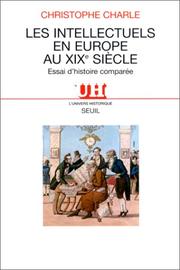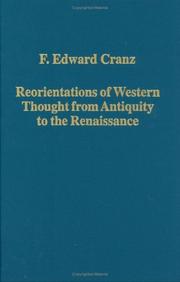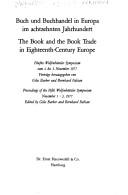| Listing 1 - 10 of 46 | << page >> |
Sort by
|
Book
ISBN: 9461662149 9789461662149 9789462700000 9462700001 Year: 2014 Publisher: Leuven, Belgium : Leuven University Press,
Abstract | Keywords | Export | Availability | Bookmark
 Loading...
Loading...Choose an application
- Reference Manager
- EndNote
- RefWorks (Direct export to RefWorks)
This volume examines the cultural contribution of religious institutes, men and women religious, and their role in the constitution of Catholic communities of communication in different European countries (England, Germany, Liechtenstein, the Low Countries, the Nordic Countries, Switzerland). The articles focus on social and cultural history by comparing both discourses and cultural and social practices, as well as examining international networks and cultural transference. How did religious institutes function as cultural elites in the production and mediation of knowledge, ideologies, cultural codes, and practices? What kind of discursive and operational strategies did they use to help construct and propagate social Catholicism, ultramontanism, and confessionalism, and to establish and promote the Catholic communication system? What were the central mechanisms in the production of knowledge and how were they incorporated within identity politics?0The volume also takes a broad perspective on the role of religious institutes in the production and propagation of religious, cultural, and social practices, and in the socialisation of the Catholic population. The focus is on cultural practices, on the transmission and transformation of attitudes, and on the rites and customs in everyday religious and social practices.
Catholics --- Christian communities --- Christian communes --- Communes, Christian --- Communities, Christian --- Religious communities --- Christians --- Intellectual life --- History --- Catholic Church --- Europe --- Church history --- Christian communities - Catholic Church - History - 19th century --- Christian communities - Europe - History - 19th century --- Christian communities - Europe - History - 20th century --- Catholics - Europe - Intellectual life - 19th century --- Catholics - Europe - Intellectual life - 20th century --- Europe - Church history - 19th century --- Europe - Church history - 20th century --- Europe - Intellectual life - 19th century --- Europe - Intellectual life - 20th century
Book
ISBN: 0801498813 0801414709 9780801498817 Year: 1982 Publisher: Ithaca (N. Y.): Cornell university press,
Abstract | Keywords | Export | Availability | Bookmark
 Loading...
Loading...Choose an application
- Reference Manager
- EndNote
- RefWorks (Direct export to RefWorks)
Europe --- Council of Europe countries --- Eastern Hemisphere --- Eurasia --- Intellectual life --- Congresses. --- History of civilization --- Philosophy and psychology of culture --- Congresses --- Europe - Intellectual life - 20th century - Congresses
Book
ISBN: 140086044X 9781400860449 0691067902 0691014663 0691608164 9780691608167 Year: 2014 Publisher: Princeton, NJ : Princeton University Press,
Abstract | Keywords | Export | Availability | Bookmark
 Loading...
Loading...Choose an application
- Reference Manager
- EndNote
- RefWorks (Direct export to RefWorks)
Integrating the study of both music and art into an exploration of the early poetry of Eugenio Montale (1896-1982), this book situates Italy's premier poet of the twentieth century within the Modernist movement. Gian-Paolo Biasin finds in Montale's poetry broad resonances, reverberations, and comparisons that involve it in the European culture of its time and that invite the reading of poetry, music, and painting as texts in a cultural system. This interdisciplinary approach expands our appreciation of Montale's work in a way not possible with literary analysis alone.Biasin's study first shows the structural homology between some of Debussy's preludes for piano and certain poems in Montale's Ossi di seppia, emphasizing the rhythmic qualities of the compositions. This formal analysis leads to an understanding of the respective texts' thematic, symbolic, and cultural meaning--specifically, antiheroism as a choice of life. Similar methodology is then used to reveal the relationship between the poetry of Montale and Giorgio Morandi's etchings and between Montale's poetic persona, Arsenio, and the novelistic characters of Svevo and Pirandello. Each of these comparisons brings to light a shared image, that of the clown (or antihero) as a mocking self-portrait of the modern artist.Originally published in 1989.The Princeton Legacy Library uses the latest print-on-demand technology to again make available previously out-of-print books from the distinguished backlist of Princeton University Press. These editions preserve the original texts of these important books while presenting them in durable paperback and hardcover editions. The goal of the Princeton Legacy Library is to vastly increase access to the rich scholarly heritage found in the thousands of books published by Princeton University Press since its founding in 1905.

ISBN: 2020239574 2021164764 2021164888 9782020239578 Year: 1996 Volume: *51 Publisher: Paris : Editions du Seuil,
Abstract | Keywords | Export | Availability | Bookmark
 Loading...
Loading...Choose an application
- Reference Manager
- EndNote
- RefWorks (Direct export to RefWorks)
History of Europe --- anno 1800-1899 --- Intellectuals --- Intellectuels --- History --- Histoire --- Europe --- Intellectual life --- Vie intellectuelle --- Council of Europe countries --- Eastern Hemisphere --- Eurasia --- -Europe --- -History of Europe --- -Intellectuals --- 19th century --- Europe - Intellectual life - 19th century --- INTELLECTUELS --- VIE INTELLECTUELLE --- EUROPE --- 19E SIECLE

ISBN: 0860789837 9780860789833 Year: 2006 Volume: 840 Publisher: Aldershot: Ashgate,
Abstract | Keywords | Export | Availability | Bookmark
 Loading...
Loading...Choose an application
- Reference Manager
- EndNote
- RefWorks (Direct export to RefWorks)
Philosophy --- Learning and scholarship --- History. --- History --- Europe --- Intellectual life --- To 1500 --- Erudition --- Scholarship --- Civilization --- Education --- Research --- Scholars --- Intellectual life. --- Philosophy - History. --- Learning and scholarship - History - To 1500. --- Europe - Intellectual life - History.
Book
ISSN: 09208607 ISBN: 9789004211162 9789004236356 9004211160 900423635X 9781283979979 1283979977 Year: 2013 Volume: v. 213 Publisher: Leiden ; Boston : Brill,
Abstract | Keywords | Export | Availability | Bookmark
 Loading...
Loading...Choose an application
- Reference Manager
- EndNote
- RefWorks (Direct export to RefWorks)
Johan DavidÅkerblad (1763–1819) contributed to the decipherment of Egyptian hieroglyphs and Demotic and is known as a predecessor of Jean-François Champollion. This intellectual biography offers a new and less heroic interpretation of the first reading of the Egyptian scripts.Åkerblad, an exceptional linguist, was a diplomat and orientalist who spent several decades living in the Ottoman Empire, France and Italy. Of humble birth, he was a supporter of the French Revolution – something that stymied his career. His life cannot be understood in a purely Swedish national framework, and this study firmly situates him as an international scholar. The book discusses European expansion in the Eastern Mediterranean during the tumultuous decades around the year 1800, and tracesÅkerblad’s momentous life in relation to the debates on ‘orientalism,’ the tradition of classical studies and the history of science.
Middle East specialists --- Diplomats --- Linguists --- Åkerblad, Johan David, --- Europe --- History --- Intellectual life --- A°kerblad, Johan David, 1763-1819. --- Diplomats -- Sweden -- Biography. --- Europe -- History -- 1789-1900. --- Europe -- Intellectual life -- 18th century. --- Europe -- Intellectual life -- 19th century. --- Linguists -- Biography. --- Middle East specialists -- Biography. --- Regions & Countries - Asia & the Middle East --- History & Archaeology --- Middle East --- Åkerblad, Johan David, --- Middle Eastern studies specialists --- Orientalists --- Åkerblad, J. D. --- Akerblad, J.D. --- Area specialists --- Asianists
Book
ISBN: 9781107018211 9781139087490 9781139424035 1139424033 1139087495 9781139419949 1139419943 1107018218 1107230896 1139411594 1280773758 9786613684523 1139422960 1139417908 1139421999 1108436625 9781108436625 Year: 2012 Volume: 99 Publisher: Cambridge ; New York : Cambridge University Press,
Abstract | Keywords | Export | Availability | Bookmark
 Loading...
Loading...Choose an application
- Reference Manager
- EndNote
- RefWorks (Direct export to RefWorks)
Republic of Women recaptures a lost chapter in the narrative of intellectual history. It tells the story of a transnational network of female scholars who were active members of the seventeenth-century republic of letters and demonstrates that this intellectual commonwealth was a much more eclectic and diverse assemblage than has been assumed. These seven scholars - Anna Maria van Schurman, Princess Elisabeth of Bohemia, Marie de Gournay, Marie du Moulin, Dorothy Moore, Bathsua Makin and Katherine Jones, Lady Ranelagh - were philosophers, schoolteachers, reformers and mathematicians. They hailed from England, Ireland, Germany, France and The Netherlands. And together with their male colleagues - men like Descartes, Huygens, Hartlib and Montaigne - they represented the spectrum of contemporary approaches to science, faith, politics and the advancement of learning. Carol Pal uses their collective biography to reconfigure the intellectual biography of early modern Europe, offering a new, expanded analysis of the seventeenth-century community of ideas.
Literature --- anno 1600-1699 --- Literature and society --- Women scholars --- Women --- Human females --- Wimmin --- Woman --- Womon --- Womyn --- Females --- Human beings --- Femininity --- Scholars --- Women in education --- Women specialists --- Belles-lettres --- Western literature (Western countries) --- World literature --- Philology --- Authors --- Authorship --- Literature and sociology --- Society and literature --- Sociology and literature --- Sociolinguistics --- History --- Women authors --- History and criticism. --- History. --- Intellectual life --- Social aspects --- Learning and scholarship --- Europe --- Erudition --- Scholarship --- Civilization --- Education --- Research --- Arts and Humanities --- Women scholars - Europe - Biography --- Women - Europe - Intellectual life - 17th century --- Europe - Intellectual life - 17th century --- Learning and scholarship - History - 17th century
Book
ISBN: 9789004184961 9004184961 9786612952746 900418497X 1282952749 9789004184978 9781282952744 Year: 2010 Volume: 188 Publisher: Leiden ; Boston : Brill,
Abstract | Keywords | Export | Availability | Bookmark
 Loading...
Loading...Choose an application
- Reference Manager
- EndNote
- RefWorks (Direct export to RefWorks)
How the West Was Won contains articles in three main areas of the humanities. It focuses on various aspects of literary imagination, with essays ranging from Petrarch to Voltaire; on the canon, with essays on western history as one of shifting cultural horizons and ideals, and including censorship; and on the Christian Middle Ages, when an interesting combination of religion and culture stimulated the monastic and intellectual experiments of Anselm of Canterbury and Peter Abelard. The volume is held together by the method of persistent questioning, in the tradition of the western church father and icon of the self Augustine, to discover what the values are that drive the culture of the West: where do they come from and what is their future? This volume is a Festschrift for Burcht Pranger of the University of Amsterdam.
History of civilization --- Literature --- anno 500-1499 --- Western world --- Canon (Literature) --- Christian literature. --- Christianity and literature. --- Literature, Medieval. --- Europe --- Intellectual life. --- Canon (Literature). --- Europe -- Intellectual life. --- Christian literature --- Christianity and literature --- Literature, Medieval --- Religion --- Philosophy & Religion --- Christianity --- European literature --- Medieval literature --- Christian writings --- Religious literature --- Literature and Christianity --- Classics, Literary --- Literary canon --- Literary classics --- Best books --- Criticism --- History and criticism

ISBN: 3776202017 9783776202014 Year: 1981 Volume: 4 Publisher: Hamburg: Dr. Ernst Hauswedell & Co.,
Abstract | Keywords | Export | Availability | Bookmark
 Loading...
Loading...Choose an application
- Reference Manager
- EndNote
- RefWorks (Direct export to RefWorks)
Book history --- Graphics industry --- anno 1700-1799 --- Books --- Book industries and trade --- Livres --- History --- Histoire --- Industrie --- Europe --- Intellectual life --- Vie intellectuelle --- Congresses --- Congresses. --- printed ephemera --- booksellers --- typography --- almanacs --- bookselling --- Books - History - 18th century - Congresses --- Book industries and trade - History - 18th century - Congresses --- Europe - Intellectual life - 18th century - Congresses --- booksellers [people]
Book
ISBN: 0719029252 9780719029257 0719043220 9780719043222 Year: 1991 Publisher: Manchester Manchester University Press
Abstract | Keywords | Export | Availability | Bookmark
 Loading...
Loading...Choose an application
- Reference Manager
- EndNote
- RefWorks (Direct export to RefWorks)
History of civilization --- Religious studies --- anno 1500-1599 --- Europe --- Science [Renaissance ] --- Science de la Renaissance --- Wetenschap [Renaissance-] --- Intellectual life --- 17th century --- Science, Renaissance. --- Europe - Intellectual life - 17th century. --- Aufsatzsammlung. --- Culture. --- Cultuur. --- Geschichte (1420-1600). --- Geschichte 1500-1600. --- Intellectual life. --- Renaissance. --- Science --- Sciences de la Renaissance. --- Volksgeloof. --- Volksglaube. --- Wetenschap. --- Wissenschaft. --- culture (concept). --- culture note. --- History. --- Europa. --- 1600-1699. --- Europe. --- Social life and customs --- Vie intellectuelle
| Listing 1 - 10 of 46 | << page >> |
Sort by
|

 Search
Search Feedback
Feedback About UniCat
About UniCat  Help
Help News
News